Alumni in Pro Sports
Original story by Greg McClure featured in Life360 magazine, Fall 2018, photos provided
The College of Health and Human Sciences has a deep bench of talented alumni working for professional sports teams, both as athletes and as key players behind the scenes. Here, five take the field and the court to share their stories, and how what they learned at Purdue prepared them for their careers.
Pepper Burruss, director of sports medicine administration for Green Bay Packers
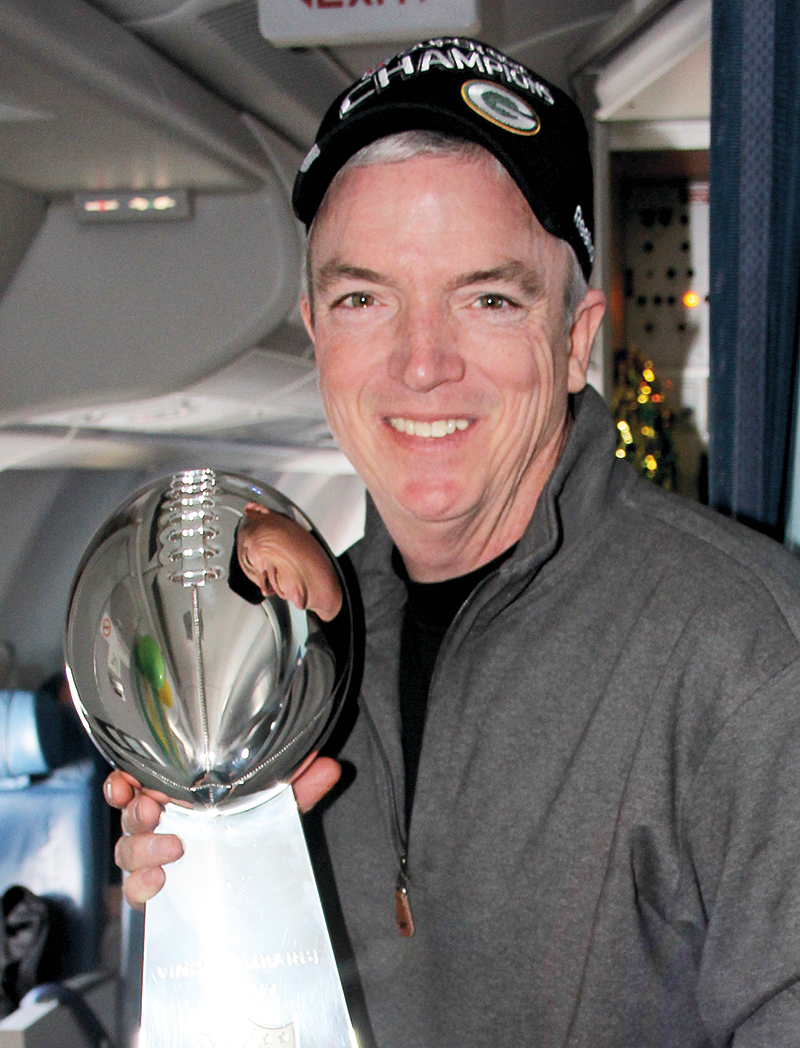
When Pepper Burruss (HK ’76) was in high school in Wappingers Falls, New York, he didn’t know Purdue existed. He wanted to be an athletic trainer. So he went to talk to Bob Reese, a Purdue graduate and a trainer at Boston College.
Reese told Burruss that he could not get the education he sought at Boston College, if he wanted to become a certified athletic trainer, because the school didn’t have an athletic training program. “I asked, ‘Where do I go’ and he said, ‘Go to Purdue.’ I asked, ‘Where is Purdue,’ and he pointed west and said ‘Go that way a long way,’” says Burruss, director of sports medicine administration for the Green Bay Packers.
So, Burruss went to Purdue, where he received an education from legendary athletic trainer William “Pinky” Newell.
“Newell was the executive secretary of the National Athletic Trainers’ Association. The ‘national office’ was primarily his desk in Mackey Arena, and then a small storefront in downtown Lafayette with one woman working in it,” recalls Burruss.
“Now the national office is in Dallas, and there are nearly 50 full-time employees. Back then, if you wanted to get an athletic training job, you went to Purdue to be around Pinky. People at national meetings would flock around him like a rock star.”
That taught Burruss a valuable lesson.
“At Purdue, I learned how critical it is to network and how important it is to add as much education as you can fit in,” he says. “I had no intention of adding degrees when I first came there. I had zero intention of becoming a physical therapist. But when I asked the staff, and Pinky, what I should do next, he said to go to physical therapy school.”
So, Burruss went to Northwestern University Medical School, where he received a bachelor’s degree in physical therapy. But his heart remains with Purdue.
“I learned a lot of things at Purdue, other than my trade. I am proud of my education, and I am a dyed-in-the-wool Boilermaker.”
Burruss went on to work 16 seasons for the New York Jets as assistant athletic trainer before going to the Packers, where he served as head athletic trainer for 22 seasons before being promoted to director of sports medicine administration in 2015.
Working in the NFL is not always what fans may think, he says.
“People see the glamour, but they don’t see all the hours, particularly those away from the football field,” he says. “People ask what kind of hours I work. I tell them that I work farmers’ hours — dark to dark and I don’t take days off. Off-season? We drop it down to about 50 hours a week. Then, add training camp, preseason games, 20 weekends that we play games during the season and the playoffs, if we make them. People say, ‘Wow, you work more than 52 weekends a year!’ That’s not possible, of course, but they get the idea.”
Cliff Avril, professional football player for Seattle Seahawks
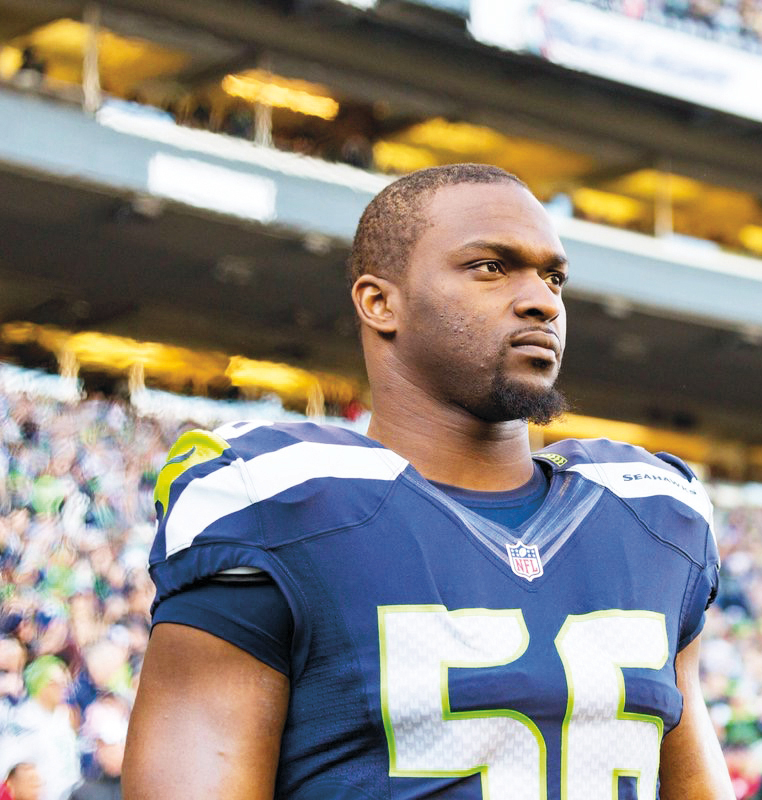
Cliff Avril (CSR ’11) learned several things at Purdue that have served him well as a professional football player.
“Time management — going to class, practice and studying — is a big part of what I gained when I was at Purdue,” says Avril, who plays for the Seattle Seahawks. “I think kids should focus more on the experience and education part of college than trying to get to professional sports because that will sort itself out as you go. If you have the discipline to do all of that, you will succeed in life as well as professional sports.”
Avril, who missed most of the 2017 season with a neck injury, says he did not think seriously about playing in the NFL when he came to Purdue.
“I knew that I had a chance of possibly going pro, but it didn’t really cross my mind until my junior year,” he says. “I was having a heck of a season, a lot of people were talking about me becoming a pro player, so then I thought ‘Maybe I have a chance.’ That’s when I thought maybe I can do that. It wasn’t a goal when I first came to Purdue, though.”
Playing in the NFL isn’t quite as exciting as it may seem, Avril says.
“Most fans see the finished product on Sundays. They don’t necessarily see how much work goes into preparing for the game,” he says. “There’s not only practice, but film study and also maintenance on your body to prepare for the game. There’s massaging, stretching, cold packs and all kinds of treatment that you have to do. During the season, we work from 7 to 5 every day, but once we get home at 6, I’m working on physical things, so the family aspect of life during the season slows down for us. For almost six months, my wife is basically running the house by herself. It’s tough on her.”
Avril says that although his Purdue degree in retail management has not had a direct impact in his playing career, he has benefited from it.
“It’s helped from the standpoint of what I’ve tried to accomplish off the field, with business ventures,” he says. “I’ve been involved in real estate and some other things, so that’s when I dust off the books a bit. It may help when I’m studying the playbook.”
Tara Gidus Collingwood, dietitian for Orlando Magic
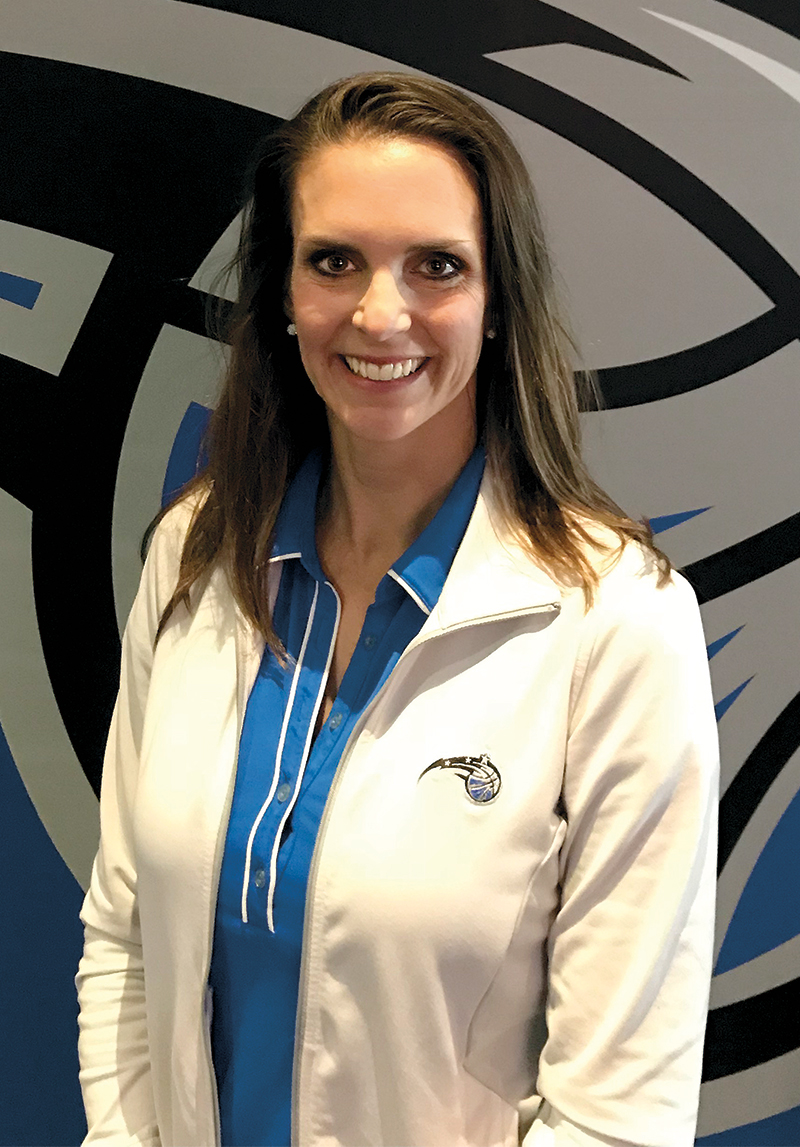
In her job as dietitian for the NBA’s Orlando Magic, Tara Gidus Collingwood (NUTR ’97, HK ’99) sees a side of professional athletes that most fans don’t.
I have taken them grocery shopping, taught them how to cook and even helped them shop to outfit their kitchens,” she says. “Some of the players are only 19 or 20 and have never cooked or lived on their own. They don’t even own a pot or pan. It can be pretty funny going to a home goods store with someone 7 feet tall and filling shopping carts with blenders and griddles.”
Collingwood says athletes’ emphasis on nutrition is a recent trend.
“A lot of them see news stories and read about fad diets just like the general public. So they come in and ask about every diet out there,” she says. “A lot of my job is education, dispelling myths and talking with them about what is right for them and their sport. Many of them also think that since they are lean and young, they can eat whatever they want because they burn it off. I try to tell them that it’s not just about weight, but about performance. They might not gain weight from eating certain foods, but it can definitely affect their performance.”
Collingwood chose Purdue, where she also earned a master’s degree in health promotion, which surprised her dad.
“I grew up in Wisconsin and he always thought I would go to the University of Wisconsin, and it is a great school with an excellent dietetics program,” she says. “But I decided to go to Purdue because of the dual emphasis of sports nutrition. I told my dad when I was 17 that I was going to be the dietitian for the Green Bay Packers, who at the time didn’t even have a dietitian. He just laughed and said, ‘Yeah, right.’”
Studying dietetics, and nutrition, fitness and health at Purdue gave Collingwood, who also works with the United States Tennis Association, a good background.
“I spent a lot of time in the Department of Health and Kinesiology,” she says. “I learned a lot about athletics and exercise, including how to prevent injuries, and how nutrition could assist athletes in improving their performance.”
Collingwood says those who want to get into her line of work should get a dual degree in exercise science and sports nutrition/dietetics, and gain experience though a job shadow, a volunteer position or an internship with a sports dietitian in a collegiate setting.
Annie Drews, professional volleyball player for USA Volleyball, Women’s National Team
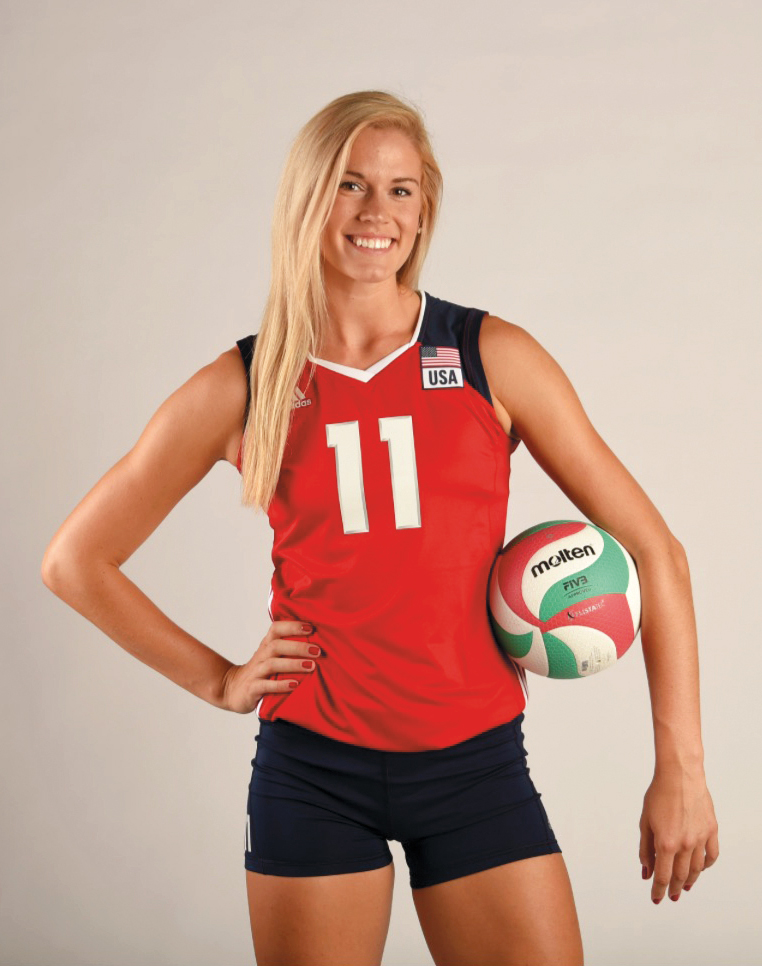
Becoming a professional volleyball player was not Annie Drews’ (HTM ’14) objective when she came to Purdue.
“I knew the possibility might present itself, but I wouldn’t say my goal at Purdue was to play professionally,” she says. “My whole experience with professional volleyball has shown me how unpredictable life is. I never thought this is what life would be like at 24, but I feel more on the right path than I ever have before because I’m learning new things each day.
“If something is unfamiliar, scary, vulnerable or challenging, it’s worth some consideration. We aren’t made to live comfortably all the time.”
Drews has learned that, in part, because to play professional volleyball, athletes must go overseas. She now plays for the USA Volleyball Women’s National Team, but next season will be playing professionally in Italy. Before that, she played professionally for two other Italian teams, Pomi Casalmaggiore and SAB Legnano. The first professional team she played for was Indias de Mayaguez in Puerto Rico.
“A lot of people are surprised to hear that the U.S. doesn’t have professional volleyball. Every national team player must play abroad if they want to make a living and build a career,” Drews says. “We are in Europe, Asia and South America from September to April, come home for a week, and then the national team regroups in Anaheim, California, for training from May through August. People are surprised to hear that we are gone so much.”
Drews says her experiences at Purdue and the College of Health and Human Sciences have helped in a number of ways.
“The student-athlete support was top-notch and volleyball wasn’t a secondary sport, but a huge priority in athletics,” she says. “I knew that I wanted to study something with food to allow me to follow my passion for the food industry. There’s not much overlap between my pro career and my degree, however, it is really fun to travel as much as I do and be able to see how the food and lodging industry varies from place to place.
“Purdue is what you make it, and it really felt all-inclusive. It checked a lot of boxes for me.”
Ted Harper, dietitian/nutritionist New England Patriots
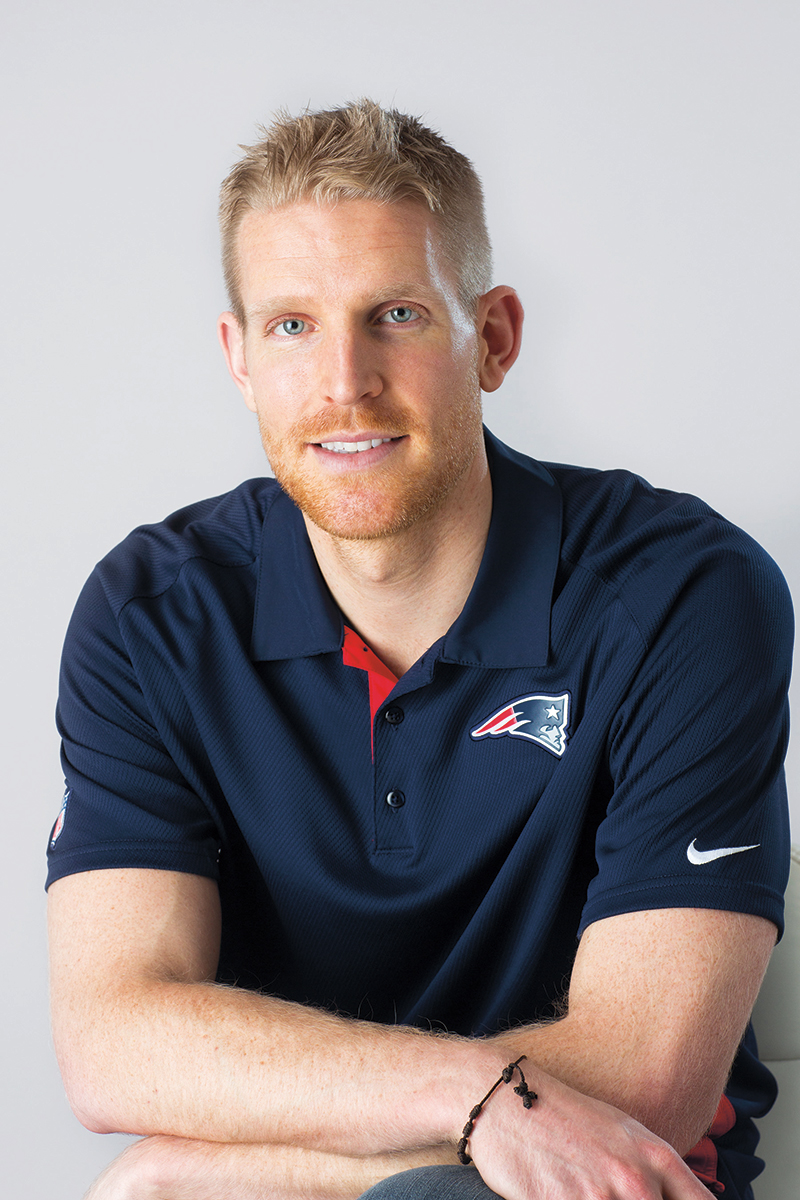
Ted Harper (NUTR ’08), team sports dietitian/nutritionist for the New England Patriots, credits Purdue for giving him the skills he needed for his career in sports nutrition.
“The core skill set of how I practice, and how I practice well, I learned at Purdue,” Harper says. “I learned food service here and had many courses in that. The Patriots have their own chefs. I have full control over what farms we order from, and I tell the chefs how to prepare it.
“I also learned a lot in a nutrition communications course I took from Barbara Mayfield. I learned how important soundbites are. Many athletes have short attention spans. I have to make what I tell them short, brief and impactful, and get straight to the point. Barbara also taught me how to build a story, to build a beginning and an ending and include many soundbites. The biggest thing I learned is doing an education assessment to try to figure out what you need to do to keep people learning. Are they a verbal or non-verbal learner? I do a ton of research on incoming rookies and free agents to learn how to teach them and how they learn.”
When he was at Purdue, Harper’s goal was to be a head sports dietitian for a Division I university. After receiving his bachelor’s degree, and then earning a master’s degree at the University of Utah, he began to question whether that was what he wanted to do.
A blind call from a recruiter led him to take a job training U.S. Air Force pilots. He then worked with the U.S. Army, helping train soldiers. While attending a conference, he was asked twice by representatives of the Patriots to interview for a job.
“I asked my colonel what he thought, and he said that he thought that I should do the interview and see what happens,” Harper says. “I ended up earning and taking the position with the Patriots. I consider my contracting position with the Army a dream job, but now that I’m here, this really is my dream job.”
Some aspects of that job might surprise some people.
“A lot of the public doesn’t understand the amount of studying done by athletes at the team’s facilities,” he says. “From Monday through Saturday they’re working all day, and not just practicing. They’re studying game film, the playbook and working on techniques. They put in so much work to support themselves and their families. And my job is to be there even more than that to support them.”